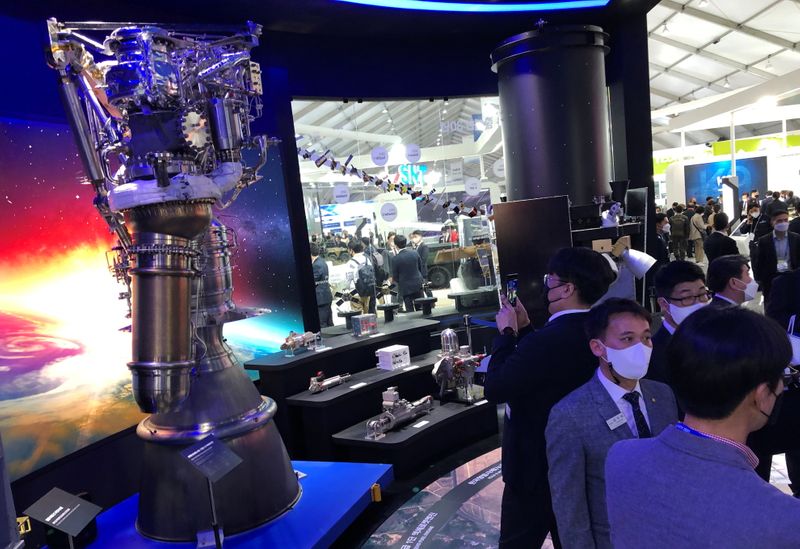By Josh Smith and Sangmi Cha
GOHEUNG/SEOUL, South Korea (Reuters) -South Korea's push for a domestically made space rocket promises wide-ranging benefits for its military and government, with a fillip to national prestige - but it is also good for business.
Despite Thursday's mission being incomplete, the project will press ahead towards its goal of launching satellites into orbit and joining in space exploration with five more launches scheduled by 2027, President Moon Jae-in said.
Moon, who watched the launched from the space centre, said the rocket completed all its flight sequences but failed to put its test payload into orbit.
The test of the Nuri rocket is a milestone for firms such as Hanwha Aerospace, which makes rocket boosters and other launch components, and Korea Aerospace Industries, which oversaw assembly of the launch vehicle.
"Hanwha built the engine, but KAI was responsible for assembling about 300,000 components of the rocket," said Choi Gwang-shik, an analyst with Korea Investment & Securities.
"And these components came from myriads of companies, including the shipbuilder Hyundai Heavy Industries. The launch would broadly benefit all firms involved."
About 300 South Korean firms were involved in producing the 200-ton, three-stage Nuri, Yong Hong-taek, first vice minister of science and technology, told a briefing at the space centre.
The Korea Aerospace Research Institute (KARI) plans several more tests of Nuri before it carries a real payload, but looks to partner more closely with a single firm on assembly and launch processes, similar to the way in which NASA works with SpaceX in the United States, officials said.
"As we will attempt another five launches in the future we are planning to transfer all technology to the private sector eventually," Yong said.
Although the space programme lags many other nations, including neighbours China and Japan, South Korea is eager to catch up, and its companies look set to ride a wave of new government funding.
Since March 2010, South Korea has invested about 2 trillion won ($1.70 billion) in the Nuri development project, while annual investment in space projects has more than doubled, to 616 billion won ($524 million) in 2020 from 305 billion in 2013, the National Assembly Research Service said.
President Moon pointed to the rocket as an example of the efforts of the homegrown defence and aerospace industry, which he wants to supercharge.
The government will foster the private space sector to make South Korea "a space powerhouse," he told the Seoul International Aerospace & Defense Exhibition this week.
The space efforts also stand to benefit makers of surveillance, navigation, and communications satellites, as well as other industries.
The government plans to spend 3.7 trillion won ($3.1 billion) to develop a Korea Positioning System with eight satellites to ensure the accuracy needed to develop technology such as self-driving cars, ministry spokesman Koo Hyuk-chae said.
"We believe that will trickle down to the whole industry," he told Reuters.
South Korea plans a 4% increase in its space budget of 640 billion won ($544 million) for next year.
In August the defence acquisition agency said it would invest about 1.6 trillion won ($1.4 billion) over the next 10 years in the domestic defence satellite sector.
Shares of Hanwha Aerospace, which makes everything from rocket engines and howitzers to surveillance technology, have soared 73% this year.

The firm will focus on providing quality engines for future Nuri launch vehicle tests, a spokesperson said, adding that it had a rough investment target of about a trillion won ($849 million) or more in the space business by 2030.
($1=1,175.8800 won)